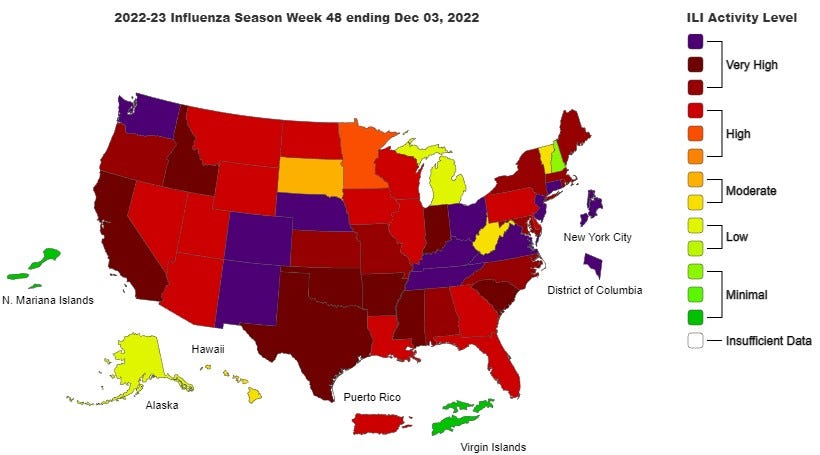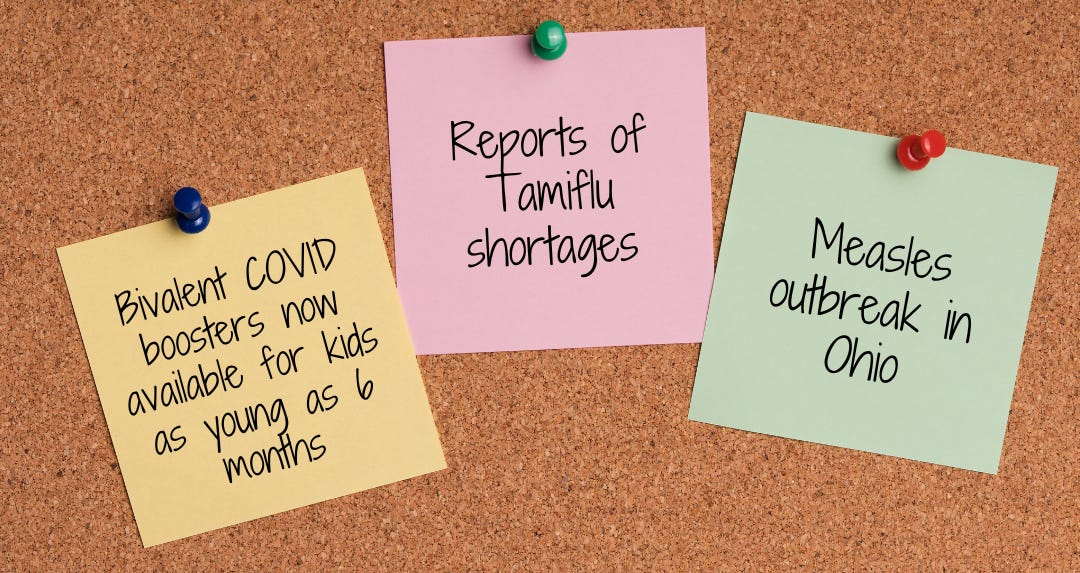Three Things Thursday
Given that we are living through THREE global health emergencies (COVID, polio, and monkeypox), new vaccines are being approved, new outbreaks are occurring, and the reality that being healthy is being redefined as a radical selfless act of loving others, “Three Things Thursday” highlights three things I am paying attention to as an epidemiologist each week.
Hoping these posts help to educate and empower you
to be healthy and create healthy communities.
Today’s three things Thursday —
Bivalent COVID Boosters for Our Youngest Kids Available
Last Thursday (about an hour after I posted my Three Things Thursday) the FDA authorized the bivalent COVID booster vaccine for kids as young as 6 months. According to the FDA Commissioner, Dr. Robert Califf —
“More children now have the opportunity to update their protection against COVID-19 with a bivalent COVID-19 vaccine, and we encourage parents and caregivers of those eligible to consider doing so – especially as we head into the holidays and winter months where more time will be spent indoors.”
Exactly which children can get which booster (Pfizer vs Moderna) and when is a little confusing…
Moderna’s bivalent booster shot can now be given to children 6 months through 5 years of age two months after their initial vaccination.
Pfizer’s bivalent booster shot can now be given to kids 6 months through 4 years, who have not completed their primary vaccination series (which includes 3 shots of the original vaccine) or if they have NOT received the third dose. IMPORTANT: children 6 months — 4 years who have completed their initial three-dose vaccination series with Pfizer’s original vaccine are NOT eligible at this time to receive the bivalent booster.
Vaccinating our youngest children is really important.
We CANNOT predict which children will have a severe illness from a COVID infection. More than 50% of the 120,000 kids who have been hospitalized with COVID did not have an underlying medical condition. They were healthy kids who got really sick from COVID-19.
Vaccines have also been shown to decrease the incidence of long-term health conditions due to COVID, such as long-COVID and MIS-C.
Getting vaccinated is so important.
Reports of Tamiflu Shortages
As influenza cases increase across the country, CDC announced yesterday that they are receiving reports of limited supplies of oseltamivir (better known as Tamiflu) from different communities across the country. In response to those reports, CDC released an announcement through its Health Alert Network to provide guidance to medical and public health officials who may be working with a limited supply of oseltamivir.
Here is what is important to know about the reports of reduced availability of oseltamivir…
First (and probably most important) — FDA has NOT indicated that there is a supply shortage. Right now we are working with antidotal reports from different communities. CDC communicating that they are receiving these reports and providing guidance for localities where supplies might be limited is NOT a sign of concern or alarm.
Second, there are four antivirals (including oseltamivir) that are approved to treat influenza. Again, no need to panic.
At this point in time, it is really important for you to know that influenza continues to spread across the United States and is causing a lot of illnesses.

To date, there have been 13 million cases, 120,000 hospitalizations, and 7300 deaths from influenza this season alone. The best way to protect yourself from the flu is through vaccination. It is not too late to get your flu shot.
Antiviral treatments, including oseltamivir, are given early in the course of illness to reduce the duration of symptoms and (may) reduce the risk the severe complications caused by the influenza virus. You need a prescription from a healthcare provider for any of these antiviral treatments.
Measles Outbreak In Ohio
Tuesday’s headline on MedPage Today says it all —
The measles outbreak in Columbus, Ohio began in November. The first four cases occurred among unvaccinated kids (with no travel history) who attend the same daycare facility. The number of measles cases continues to increase (74 cases this week, 50 last week). Of particular concern —
56 of the 74 cases (76%) are old enough to be vaccinated with the MMR (measles, mumps, rubella) vaccine, but their parents have chosen not to vaccinate them.
26 children (35%) have been hospitalized.
Kelli Newman, Director of Public Affairs and Communications at Columbus Public Health, noted —
“Many of these children have been very sick and required hospitalization. We've had 26 hospitalizations so far, which is a reminder that measles is a very serious disease and can make children very sick," she added. "Children can suffer a variety of complications, including dehydration, pneumonia, and neurological conditions like encephalitis…. Unfortunately, we are not seeing an uptick in MMR vaccine uptake despite the outbreak, and we do anticipate that cases will continue to grow before it begins to subside."
Children with measles visited a grocery store, church, and several department stores while they were contagious — potentially exposing 1000s of additional individuals. The outbreak has become so widespread and the virus is so contagious —
“it could take a few months before we get this outbreak under control,”
according to Lori Tremmel Freeman, the Chief Executive Officer at the National Association of County and City Health Officials.
Measles can be prevented with two doses of the MMR vaccine (it is 97% effective). Children should be vaccinated at 12-15 months and then again at 4-6 years of age.
Have questions?
Tomorrow I will be sharing a special edition of Epi Matters all about measles — it is one of my favorite diseases! Be sure you are subscribed so you don’t miss it. Measles is both deathly and fascinating.







